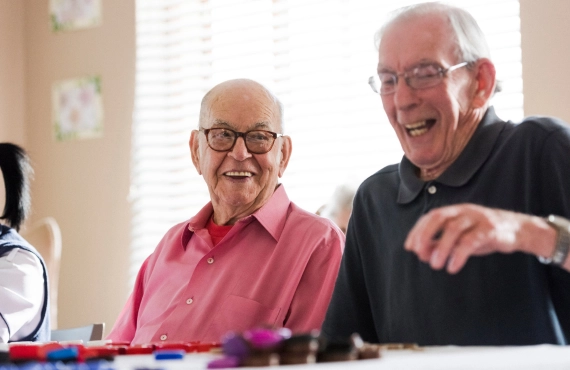Understanding the Psychological Effects of Gambling on Seniors in Nursing Homes

On certain days or nights, in the main gathering rooms of a quiet nursing home, where the days can blur into one another, you’ll hear tinkles of laughter and chatting when senior citizens congregate to gamble. Whether it’s the joyous declaration of “BINGO,” a poker game between old friends, or even residents playing on online gambling sites, seniors enjoy the thrill of the game. After all, age is just a number.
And it’s not just about winning—it’s the fun and camaraderie that come with it! Did you know that almost 70% of seniors in nursing homes engage in some form of gambling, from bingo to card games?
We didn’t! But were we surprised? Not at all. It makes perfect sense when you think about it: not only is it an escape from the dull (and, let’s face it, probably depressing) days in a nursing home, but it has beneficial aspects for the residents! That’s why we are doing an exploration of the psychological impact of gambling on seniors in nursing homes. We’ll look at both the positive boosts to their mental health and, of course, the possible dangers of developing a gambling addiction at an advanced age.
Overview of Gambling Activities in Nursing Homes
Gambling in nursing homes has always been around, but the trend is growing! It’s both entertaining and boosts social interaction for the residents. So what are the different types of gambling activities available? How common are they? And why are they so popular among seniors?
Definition and Types of Gambling Activities
- Bingo: Bingo is a staple in almost all nursing homes, known for its simplicity and social appeal. It’s a game that involves matching numbers on a card to those called out by a host. This game not only provides mental stimulation but also serves as a social hub where residents can gather and mingle.
- Casino Nights: Casino nights bring the excitement of a casino to the nursing home. These events often feature games like poker, blackjack, and roulette, allowing residents to enjoy the excitement of gambling in a controlled environment. These nights are usually organized as special events and can create a fun and festive atmosphere.
- Online Gambling: With the advent of technology, online gambling has become accessible to seniors. Many elderly residents in nursing homes have embraced online gambling sites. This form of gambling offers convenience and a wide range of gaming options, making it a popular choice for those who are tech-savvy.
- Lottery and Raffle Draws: Nursing homes will sometimes organize lottery or raffle draws, where residents can purchase tickets for a chance to win prizes. These events are simple to set up and can be quite exciting.
- Horse Racing Simulations: Some nursing homes use video or mechanical horse racing games. Residents place bets on horses, and winners are determined by the outcome of the race.
- Card Games: In addition to poker, other card games like bridge, rummy, and gin can be popular. These games require strategic thinking and can be very engaging.
- Slot Machines: In some nursing homes, small-scale slot machines are available. These machines are usually set to free play, allowing residents to enjoy the experience without any financial risk.
- Casino Trips: Most nursing homes offer day trips outside of the residence—one of them being trips to physical casinos. They provide the transportation, and it’s a great way for the residents to have a fun day away!
Prevalence and Popularity
Gambling activities are actually quite prevalent among seniors in nursing homes. Research indicates that about 70% of elderly residents engage in some form of gambling! As an example, 23% of older adults play bingo more than four times a month, and 16% participate in day trips to casinos at least once a month—a survey found that 28% of people aged 65 and older had visited a casino in the past year, showing the broad appeal of gambling among seniors.
Reasons for Popularity Among Seniors

The popularity of gambling among seniors can be attributed to several factors:
- Mental Stimulation: Games like bingo and poker require strategic thinking and quick decision-making, which help keep the mind sharp.
- Social Interaction: Gambling activities are usually social events, providing a way for residents to connect and build relationships.
- Entertainment: Gambling offers a break from the monotony of daily life in a nursing home, providing excitement and something to look forward to.
- Accessibility: With organized casino nights and online casino sites, gambling is easily accessible to seniors, making it a convenient form of entertainment.
Psychological Benefits of Gambling for Seniors
Gambling in nursing homes gives the residents so much more than mere entertainment; it can positively impact the psychological well-being of seniors. By engaging in gambling activities, seniors get a triple play of mental stimulation, social interaction, and emotional well-being.
Mental Stimulation
Gambling activities, like bingo and card games, require seniors to stay alert and make quick decisions, which helps keep the mind sharp. These games engage different parts of the brain, requiring strategies and problem-solving skills. Bingo, for instance, requires players to listen attentively to the numbers called out and quickly mark their cards, promoting multitasking and cognitive speed.
Comparison with Other Mentally Stimulating Activities
Compared to other mentally stimulating activities like jigsaw puzzles or crosswords, gambling provides a dynamic and interactive environment. While jigsaw puzzles are usually a solitary challenge, gambling introduces a social component that can improve cognitive engagement through interaction and competition. The anticipation and excitement associated with gambling can be much more stimulating than the repetitive nature of some other activities.
Social Interaction
Gambling activities in nursing homes, for the most part, are social events where residents can gather, chat, and enjoy each other’s company. This social aspect is really important for seniors, as it helps combat and even decrease feelings of loneliness and isolation. Regular gambling events provide a structured chance for seniors to interact with peers and build connections and even lasting friendships.
Examples of Successful Social Events Centered Around Gambling
Bingo nights are a perfect example of successful social events in nursing homes. These types of gatherings are not just about the game but also about the companionship and sense of community they bring with them. Casino nights change the sedate and sterile nursing home environment into a more lively social center where residents can play games like poker and blackjack, enjoy themed decorations, and take a break from their routine. These kinds of events are always well-received and eagerly anticipated by the residents!
Emotional Well-being
Gambling can bring joy and fun to seniors, contributing to their overall emotional well-being. The potential to win a game, combined with the engaging atmosphere, can elevate mood and provide a sense of accomplishment. Studies have shown that recreational gambling can increase happiness levels and even have therapeutic benefits for seniors, helping to alleviate anxiety and depression.
Case Studies
The National Library of Medicine published a study that evaluated “The Effect of Gambling Activities on Happiness Levels of Nursing Home Residents” and found the following:
“The current study evaluated the effect of participating in simulated gambling activities on happiness levels of 3 nursing home residents. A 4-component analysis was used to measure objective responses associated with happiness during baseline, varying durations of engagement in simulated gambling activities, and 2 follow-up periods. Results indicated that all residents exhibited a higher percentage of happiness levels while engaged in simulated gambling activities compared with baseline. Follow-up assessment took place 10 min and 30 min following the intervention; no lasting effects were observed.”
The study took place in a 159-bed nursing home. Three residents with a history of gambling, as noted by their caregivers, participated in the study. Donna, Lily, and Fred had lived in the nursing home for at least four years, were over 80 years old, and had no diagnoses of dementia or other cognitive disabilities, according to their medical records.
“Engaging the elderly in preferred activities and thus improving their quality of life has the potential to produce positive health benefits (Wang, Karp, Winblad, & Fratiglioni). One such activity is recreational gambling. Recent research suggests that positive health benefits from gambling can occur in the elderly (Vander Bilt, Dodge, Pandav, Shaffer, & Ganguli). In this study, a large group of rural community-dwelling elderly was assessed across a number of factors including the predictability of regular gambling. Those individuals who frequently gambled had higher self-reported health, lower rates of depression, and a greater social support network than non gambling peers. Other researchers have noted that gambling is beneficial to the mental health of the elderly because it not only provides a social activity but also involves using problem-solving skills, concentration, and memory (Christensen & Patsdaughter).”
In the initial phase of the paired-choice preference assessment, Donna, Lily, and Fred selected gambling-related stimuli 81%, 76%, and 100% of the time, respectively. When the choices were limited to gambling or people-related stimuli, all three chose gambling stimuli in 75% of the trials and people stimuli in just 25% of the trials. These results showed a clear preference for gambling activities among the residents.
Personal Stories or Testimonials from Seniors Who Benefit
The seniors who participate have shared positive experiences regarding their participation in gambling activities.
- One resident said, “Playing bingo here is the highlight of my week. It’s not just about the game, but the fun we have.”
- Another senior stated, “I really look forward to our casino nights. It’s a chance to feel young again, to enjoy a bit of the excitement that I used to when I used to go to real casinos.”
These testimonials illustrate the impact gambling can have on the emotional and psychological well-being of seniors in nursing homes. They aren’t just a source of entertainment—they’re an important outlet for social interaction and mental engagement!
Gambling activities in nursing homes provide psychological benefits by keeping the mind active, encouraging social connections, and boosting emotional well-being. When managed responsibly, they can really improve the quality of life for elderly residents.
Psychological Risks of Gambling for Seniors
While gambling does give seniors much-needed entertainment and social interaction, it also comes with some psychological risks—ones that can affect their mental, emotional, and financial well-being. Knowing and understanding what they are will help protect seniors from potential harm!
Addiction and Compulsive Behavior: Signs of Gambling Addiction in Seniors
Gambling addiction in seniors can show up in various ways. The signs can look like being a little too focused on gambling, undue stress, hiding gambling activities, and spending money they can’t afford. Seniors may also become irritable when trying to stop gambling and could be using gambling as a way to escape from personal problems or negative emotions like anxiety and depression. Cognitive impairments like dementia, Alzheimer’s, and Parkinson’s disease can worsen the risk of developing compulsive gambling behaviors.
Factors That Contribute to Addiction in the Elderly
There are several factors that make seniors more prone to gambling addiction.
- Cognitive impairments can affect judgment and decision-making, making seniors more vulnerable to gambling problems.
- Social isolation and loneliness can push seniors to gamble as a form of social interaction or emotional comfort.
- Easy access to gambling through online platforms and local casinos, along with targeted marketing campaigns, also plays a role.
- Additionally, financial insecurity can lead seniors to gamble in hopes of improving their financial situation.
Financial Implications: The Risk of Financial Loss and Exploitation
Gambling can lead to severe financial problems for everyone—seniors included. Those on fixed incomes or relying on savings can quickly rip through their resources through gambling. This financial strain can turn into debts, including credit card debt and loans from high-interest payday lenders. Financial insecurity caused by gambling can force seniors to depend on family or government assistance, making them vulnerable to financial exploitation. In some cases, seniors might lose their eligibility for Medicaid due to gambling losses, which can have devastating consequences for their healthcare needs.
Case Studies of Financial Abuse Related to Gambling
There are instances of financial abuse related to gambling, highlighting the severe impact it has on senior citizens. One case involved a senior losing their life savings to gambling, meaning they became financially dependent on their family, which created tension and stress within the unit. Another case saw a senior accumulating massive debt through gambling, resulting in financial hardship and strained relationships with loved ones.
Below are a few more scary examples of financial loss and exploitation regarding older adults:
John’s Story: John, an 82-year-old widower, developed a gambling addiction after his wife passed away. He started hitting the local casinos and eventually lost his life savings. His family only discovered the extent of his financial troubles when he could no longer pay his bills. The casino had exploited his loneliness and encouraged him to keep gambling with offers of free meals and rooms.
Eleanor’s Experience: Eleanor, a 75-year-old retired teacher, was targeted by a scammer who befriended her at a casino. The scammer convinced her to invest in fake gambling schemes, leading to a loss of over $50,000. Her cognitive decline made her an easy target for such exploitation.
David’s Case: David, a 78-year-old veteran, lost his pension to online gambling. He initially started gambling to cope with loneliness but soon found himself in debt. His family had to intervene, taking control of his finances and seeking help for his gambling addiction. This situation put a strain on family relationships and caused both emotional and financial distress.
Emotional and Mental Health Issues: Anxiety and Depression Linked to Gambling Losses
The emotional impact of gambling losses can be profound for seniors. The stress and anxiety from losing money can lead to chronic worry, negatively affecting mental health. The cycle of gambling to escape negative emotions, only to suffer further losses, can deepen feelings of despair and hopelessness, leading to severe mental health issues like major depressive episodes and heightened anxiety.
The Impact of Compulsive Gambling on Overall Mental Health
Compulsive gambling can greatly impact the overall mental health of seniors—a preoccupation with gambling and associated financial and emotional stress can lead to sleep disorders, increased substance use, and even suicidal thoughts or actions. Studies have shown that seniors with gambling disorders are at a higher risk of suicide, particularly older white men. This highlights the need for early detection and intervention to prevent this kind of tragic outcome.
Yes, gambling does provide times of happiness and engagement, but it also carries some big risks, particularly for the elderly. Recognizing the signs of addiction, understanding the financial dangers, and addressing emotional and mental health issues associated with gambling are necessary steps in protecting seniors from any adverse effects of this activity.
Balancing the Benefits and Risks
Gambling can bring happiness, fun, and social connection to seniors in nursing homes, but it also comes with potential pitfalls like addiction, financial loss, and emotional turmoil. Finding the right balance between the positive aspects and the risks is important when it comes to seniors enjoying gambling activities safely and responsibly.
Implementing Responsible Gambling Practices: Guidelines for Safe Gambling Activities in Nursing Homes
Creating clear guidelines for gambling activities can help keep a safe gambling environment for seniors. Below are some practical steps:

- Limitations on Time and Money: Set strict limits on how much time and money residents can spend on gambling activities. This can prevent excessive gambling and help keep it as a recreational activity rather than a problematic behavior.
- Low-Stakes Games: Make sure the gambling activities involve low stakes. This minimizes the financial impact even if someone gambles more frequently than intended.
- Monitoring and Supervision: Staff should monitor all gambling activities to quickly identify and address any signs of problematic behavior. Regular check-ins with residents can help gauge their gambling habits and provide support if needed.
- Variety of Activities: Provide a variety of activities besides gambling to make sure it doesn’t become the only kind of entertainment. This can include hobbies, physical exercises, and social events that provide different forms of engagement and enjoyment.
Training Nursing Home Staff to Recognize and Help Intervene or Manage Any Gambling-Related Issues
If a nursing home is thinking about incorporating gambling into the itinerary or already has it on the schedule, the staff has to be trained to know what to look for and how to intervene! Training nursing home staff is essential for a safe and supportive environment. Here’s how the facilities can accomplish this:
- Educational Workshops: Organize workshops led by experts in gambling addiction and mental health. These sessions can help staff understand the signs of gambling addiction and the best practices for intervention.
- Behavioral Protocols: Develop clear protocols for staff to follow when they identify gambling-related issues. This can include steps for initial intervention, providing resources, and referring residents to professional help if needed.
- Ongoing Support and Counseling: Equip staff with strategies to support residents struggling with gambling problems. This can involve regular counseling sessions, support groups, and access to external help from gambling addiction specialists.
Creating a Supportive Environment: Providing Resources for Residents and Families
Fashioning a supportive environment involves making sure that both residents and their families have access to the necessary resources for gambling, including the following:
- Informational Materials: Provide brochures and pamphlets that explain the risks associated with gambling and offer tips for responsible gambling. These materials can be distributed during family visits or made available in common areas of the residence.
- Regular Family Meetings: Organize meetings where families can discuss their concerns about their loved ones’ gambling habits. This open communication helps families stay up-to-date and involved in their relatives’ well-being.
- Helplines and Support Groups: Collaborate with organizations that specialize in gambling addiction to offer helplines and support groups. This provides a lifeline for residents and their families who need advice or support.
Encouraging Open Communication about Gambling Habits
Good and open communication is a huge part of stepping in before gambling starts to become a problem:
- Regular Check-Ins: Schedule regular one-on-one check-ins with residents to talk about their gambling activities. This will help identify any issues early and provide a chance to address them before they escalate any further.
- Group Discussions: Facilitate group discussions where residents can talk about their gambling experiences. Sharing stories and concerns can help reduce stigma and promote responsible behavior.
- Workshops on Responsible Gambling: Offer workshops that educate residents about responsible gambling practices. These can include sessions on setting personal limits, recognizing the signs of addiction, and knowing when to reach out and get help.
By implementing these practices and promoting a supportive environment, nursing homes can help make sure that gambling keeps being a safe and fun activity for their residents! Balancing the benefits and risks involves continuous effort and collaboration between residents, staff, and families to uphold a healthy and safe living environment for seniors.
Recommendations for Nursing Homes and Families
Balancing the fun and the potential hazards of gambling for seniors in nursing homes requires thoughtful planning and support from both the facilities and families. We have some great recommendations for nursing homes on how to safely organize gambling activities and events and keep an eye on residents, as well as sage advice for families on talking about gambling with elderly loved ones and, above all, recognizing any warning signs of gambling problems.
For Nursing Homes: Best Practices for Organizing Gambling Activities
Creating a safe and enjoyable environment for gambling in nursing homes involves implementing structured and well-supervised activities. The goal is to provide entertainment while minimizing the risks associated with gambling. Below are some of the best practices for facilities:
- Structured Events: Organize regular, structured gambling events like bingo or card games with clearly defined time limits and low stakes. This approach helps prevent excessive gambling and keeps the activity recreational rather than problematic.
- Supervision and Monitoring: Make sure that all gambling activities are closely supervised by trained staff. Staff should be super vigilant in monitoring residents’ behavior to identify and address any signs of compulsive gambling quickly. Regular check-ins with residents can help assess their gambling habits and provide necessary support if need be.
- Educational Sessions: Educate residents about the risks of gambling and promote responsible gambling practices. Inform them about setting personal limits and recognizing signs of gambling addiction. This can be done with informational sessions and the distribution of educational materials.
- Diversified Activities: Offer a host of recreational activities to make sure that gambling does not become the main form of entertainment. Add in hobbies, physical activities, and other kinds of social gatherings for a balanced and engaging environment for residents.
Strategies for Monitoring and Supporting Residents
Implementing effective strategies for monitoring and supporting residents is a must in preventing gambling-related issues. Nursing homes can do so with the following measures:
- Regular Check-Ins: Conduct regular one-on-one check-ins with residents to discuss their gambling activities. These convos help in identifying any issues early and offer an opportunity to provide support and guidance.
- Training Staff: Invest in training programs for staff to recognize signs of gambling addiction and understand appropriate intervention steps. Workshops led by mental health professionals and gambling addiction specialists can equip staff with the necessary skills to manage gambling-related issues.
- Support Systems: Establish support systems within the nursing home, such as peer support groups or counseling sessions. These support systems can provide residents with a safe space to discuss their gambling experiences and get help if they need to.
- Resource Provision: Make sure residents and their families have access to resources like helplines, support groups, and counseling services. Collaborate with external organizations that specialize in gambling addiction to offer comprehensive support.
For Families: Tips for Discussing Gambling with Elderly Loved Ones
Talking about gambling with your elderly loved ones can be hard to do, but it is a conversation that needs to take place if you want to avoid and prevent problems associated with it! Below are some tips to approach this important talk in an effective way:
- Open Communication: Approach the topic with openness and without judgment. Encourage your loved one to talk about their experiences and feelings about gambling. Creating a safe and non-judgmental space is always important for a productive conversation.
- Education and Awareness: Educate your family members about the risks associated with gambling and the importance of responsible practices. Provide them with info and resources that can help them understand the potential dangers.
- Setting Boundaries: Help your loved one set boundaries regarding the amount of time and money spent on gambling. Talk about how important it is to balance gambling with other activities and interests to keep a healthy lifestyle.
- Encouragement and Support: Give them encouragement and support by participating in alternative interests together. Show them you are interested in their hobbies outside of gambling and even help them find new things they like to do so they can cut back on their reliance on gambling for entertainment!
Signs to Watch For and How to Get Help
Recognizing the signs of gambling problems early can prevent more serious issues. Here are the signs to watch for and the steps to get help for a loved one:
- Behavioral Changes: Look for changes in behavior like a preoccupation with gambling, irritability when not gambling, or neglect of personal responsibilities and other interests. These changes can be indicators of a gambling problem.
- Financial Red Flags: Be alert to financial issues like unexplained withdrawals, missing funds, or frequent borrowing of money. These could be signs of gambling-related financial problems.
- Emotional Indicators: Be aware of any emotional changes like anxiety, depression, or mood swings, which could be linked to gambling losses or stress.
- Getting Help: If you notice these signs, encourage your loved one to seek help. Connect them with professional counseling services, support groups like Gamblers Anonymous, or helplines that specialize in gambling addiction.
- Family Support: Get involved in support networks that give guidance to families dealing with gambling addiction. These groups provide valuable advice and support for managing the situation successfully.
Balancing the benefits and risks of gambling for seniors involves creating a supportive environment where responsible practices are encouraged, and potential harms are minimized. By working together, nursing homes and families can help seniors enjoy gambling as a safe and fun pastime!
Conclusion: Should Seniors in Nursing Homes Gamble? You Bet!
Gambling in nursing homes can be a blast for seniors, bringing a much-needed dose of fun and camaraderie. But, like with any good thing, it’s all about balance—it’s important to make sure these activities are not only fun but also safe and responsible. Think of it like adding a pinch of seasoning to a dish—you want to enhance the flavor, not overpower it!
Balanced and responsible gambling activities are the main thing, and by setting up structured events with clear time and money limits and mixing it up with a variety of other enjoyable activities, seniors can keep the excitement without letting it get out of hand. It’s about giving residents the joy of the game, the thrill of a potential win, and the benefit of socializing, all while keeping things in check.
The Importance of Ongoing Dialogue and Research
Keeping the convo going is really important when it comes to gambling in nursing homes! Open and regular chats between residents, their families, and the nursing home staff are the way to spot any issues early on and keep this pastime what it should be: safe and fun. And let’s not overlook the power that research plays, which is looking for the best ways to manage gambling activities and protect our seniors. As long as everyone involved stays alert and proactive, it means that residents can keep enjoying the fun and the mental health benefits of gambling!
So, what can we do about it? Well, for nursing homes, it means putting the best practices in place: setting up fun yet controlled gambling activities, training staff to spot and deal with any gambling-related issues, and offering a variety of recreational options, making sure gambling is just one of the enjoyable activities available to residents.
For families, it’s about having open, supportive conversations about gambling. Talk to your loved ones, set boundaries, and be there to support them when needed! Know how to spot the signs of gambling problems, and don’t wait to get professional help if you need to!
Together, nursing homes and families can create a safe and more enjoyable environment for our beloved seniors. It’s about elevating their quality of life and making sure they have plenty of fun and social interaction without any of the downsides!

Alyssa contributes sportsbook/online casino reviews, but she also stays on top of any industry news, precisely that of the sports betting market. She’s been an avid sports bettor for many years and has experienced success in growing her bankroll by striking when the iron was hot. In particular, she loves betting on football and basketball at the professional and college levels.








